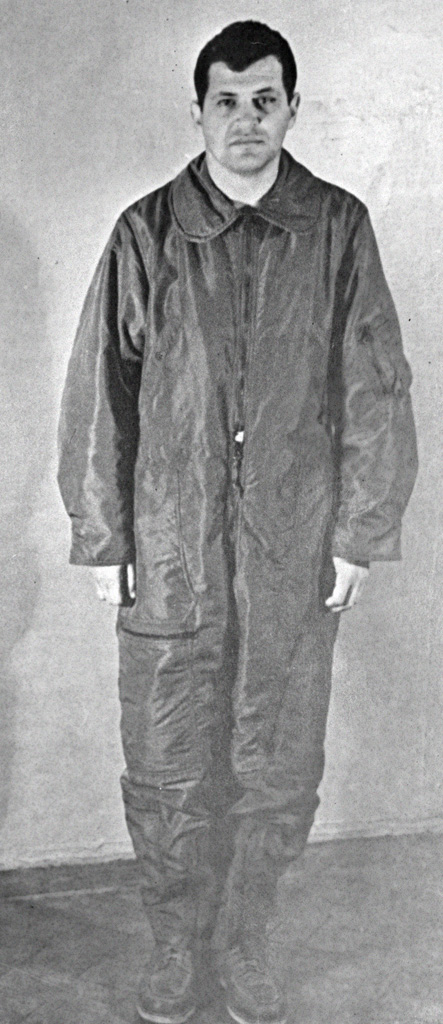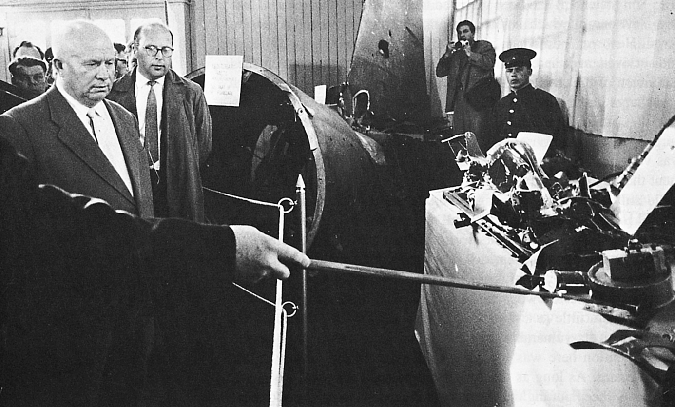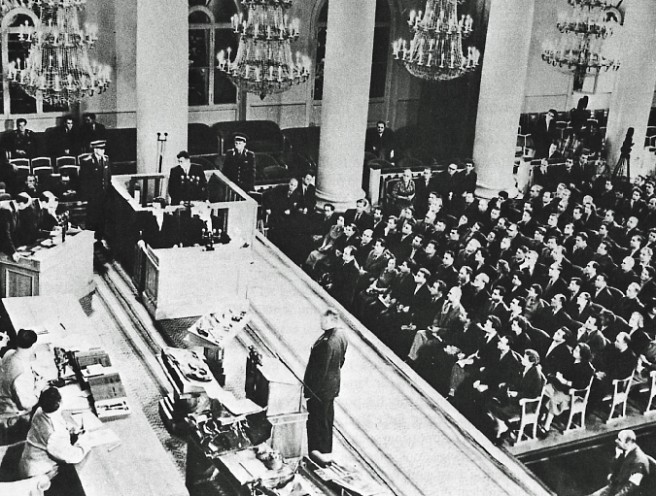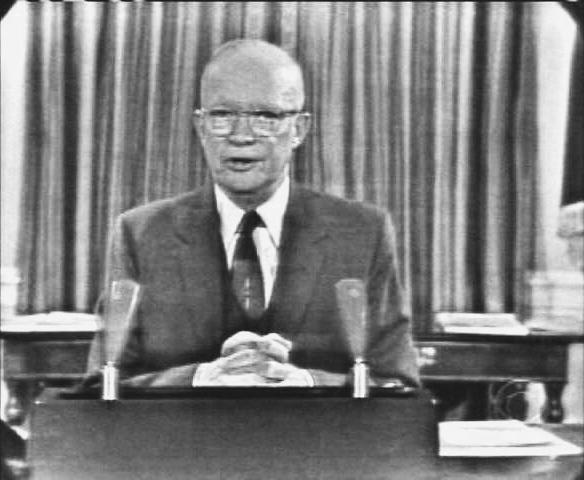|
|

 The "U-2" incident scuttles East-West "summit" diplomacy – May 1960 The "U-2" incident scuttles East-West "summit" diplomacy – May 1960
 Eisenhower's
Farewell Address (January 17, 1961) Eisenhower's
Farewell Address (January 17, 1961)The textual material on this webpage is drawn directly from my work America – The Covenant Nation © 2021, Volume Two, pages 141-142. |

|
All the supposed "thaw" in
the Cold War seemed to come to an abrupt end on May 1st (1960)
with the shooting down by
the Russians of an American U-2 spy plane over Soviet territory
just two weeks prior to
a scheduled summit meeting in Paris.
|
In his last year in office, President Dwight D. Eisenhower was hoping to finish out his presidency with the nation in an upbeat mood, with improved Soviet-American relations pointing to a more peaceful future. The Americans had been permitted to put on an American National Exhibition in Moscow in July of 1959, and Vice President Richard Nixon met Soviet Premier Nikita Khrushchev there to discuss the differences between American and Soviet society – all conducted in fair humor (the famous "Kitchen Debate"). A couple of months later (September) Khrushchev returned the favor with a two-week visit to the United States, to underline the policy of "peaceful coexistence" that was supposed to mark the new international mood. And a much larger international conference was even scheduled for mid-May in Paris of the next year (1960) to bring America, Russia, Britain, and France together as a big step in the advancement of world peace. The U-2 incident But two weeks before the event, Khrushchev announced that an American U-2 reconnaissance plane had just been shot down in a flight over the Soviet Union. This very high-level flight was not a new thing, as U-2 spy planes had been regularly overflying the Soviet Union in an attempt to locate and analyze Soviet nuclear siting and its development. Thus why Soviet leader Khrushchev chose to shoot down one of these planes just two weeks prior to the scheduled Paris summit remains a much-speculated-on mystery. Was Khrushchev feeling himself under too much pressure from Eisenhower to make deep concessions – or from party regulars not to make any concessions – in the arms race that the Soviets seemingly were winning? In any case, at the news of the downing of the U-2 plane, Eisenhower, who understood the damage this would do to his summit hopes, but who also believed that a pilot and his plane shot down at that height would not have survived the attack, claimed that the plane was a weather plane that had inadvertently strayed off course, not a spy plane. However much to America's shock, the plane did not disintegrate, and the pilot, who parachuted from the plane, was captured alive, and paraded before the world as an example of American perfidy. Not only did Eisenhower's failed cover-up provide Khrushchev the opportunity to withdraw from the Paris four-powers summit meeting with Eisenhower, French President Charles De Gaulle, and British Prime Minister Harold Macmillan, it gave the Soviets the opportunity to strike a huge propaganda blow against the United States – and the "liar" Eisenhower personally. Sadly, this left a very bad flavor to Eisenhower’s remaining months as president. He so much wanted to end his presidency on a very up-beat note. But Reality continued to show up – and had to be dealt with on its usual daily basis.
|

American U-2 spy plane with
its extra-long 80' wings
These wings allowed it to photograph
over enemy territory at a height of 13 miles.
But this was discovered
not to be
adequate enough to avoid Soviet
anti-aircraft fire
when U-2 CIA pilot Gary Powers was shot down May 1,
1960.

Soviet photo of captured
U-2 pilot Francis Gary Powers

Khrushchev visits a display of the U-2 wreckage

The Soviet trial of the U-2
pilot Powers – August 1960

|
Echo 1 – radio telecommunication satellite launched into orbit August 12, 1960

|

|
As a parting shot, Eisenhower was able to give
final advice to his fellow Americans about that Reality. This came in
the form of his January 1961 televised Farewell Address. But the warning was not heeded (or probably even understood) by most adult Americans at the time. To the patriotic Vet it was clearly just such a corporate system that not only had won the war but had also come to produce the material plenty that enhanced American life, to the envy of much of the rest of the world. It was hard for the Vet to see what was wrong in all this; it seemed instead to be so right. Thus not seeing any contradiction between the idea of American freedom and the growth of a strong corporate culture, the Vets silently stood strongly behind the growth of corporate America, politically, socially, culturally, spiritually.
|


 Miles
H. Hodges
Miles
H. Hodges